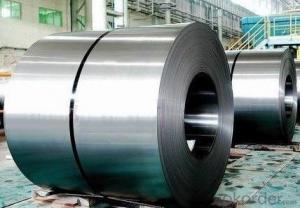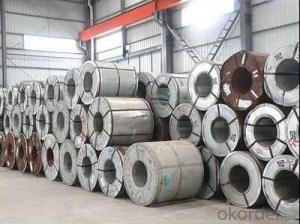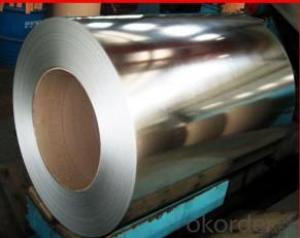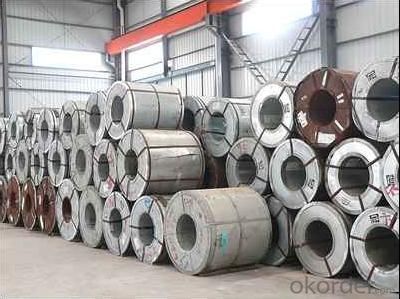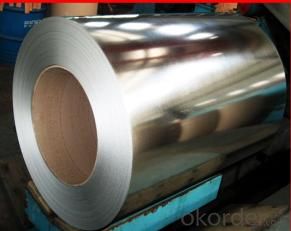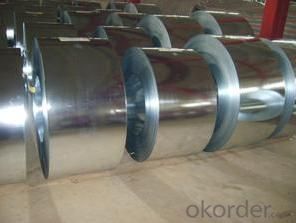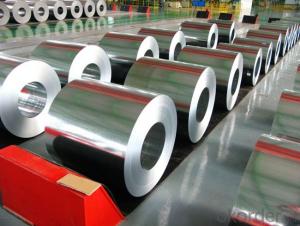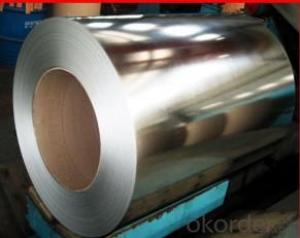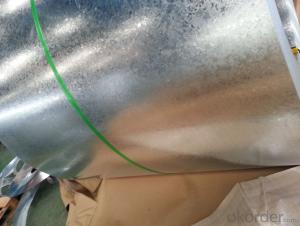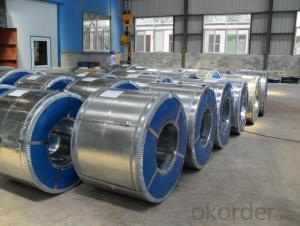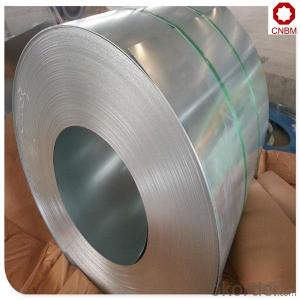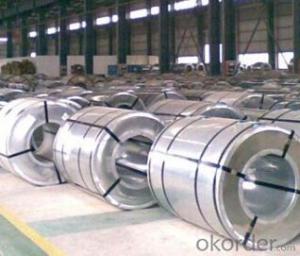Hot Dipped Galvanized Steel Coil for Mechanics Manufacuring
- Loading Port:
- Shanghai
- Payment Terms:
- TT OR LC
- Min Order Qty:
- 30 m.t.
- Supply Capability:
- 10000 m.t./month
OKorder Service Pledge
OKorder Financial Service
You Might Also Like
Basic Info.
Model NO.:GT00818
Surface Treatment:Galvanized
Additional Info.
Packing:At buyer′s requirement
Standard:GB,JIS,ASTM
Origin:CHINA
HS Code:72123000
Production Capacity:50,000 mt/year
Product Description
Commodity: Hot dipped galvanized steel coil
Size: Thickness: 0.20mm to 1.2mm; Width: 500mm to 820mm
Surface finish: Regular spangle; Small spangle
Surface treatment: Chromated passivation
Zinc coating: Z08, Z12, Z18
Packing: Mill's standard packing for exporting
Usage: used in the industries such as construction ,cold rolling forming and electro mechanics manufacturing, household electric appliance manufacturing and etc
Standard adopted: GB/T2518-1998;Also we supply such steel strips according to JIS,ASTM standard to meet users'requirements.
Steel grade: Q195,Q195L,SPCC(Other material require agreement )
Equivalent standard: JIS G3302 1998 or ASTM A653M/A924M 1998
Price Terms: FOB, CIF Term
Payment Terms: T/T, L/C at sight
Delivery: 15 days after receiving your valid L/C/down payment
- Q: I am using mild steel wire (very thin and bendable) for an art project, and would like to know if using a soldering torch is effective enough to get the job done. Or do I have to use a butane torch to heat the metal?BTW, is it better to use soft or hard solder?
- Soldering Steel
- Q: How are steel coils used in the production of building systems?
- Steel coils are used in the production of building systems by being processed and shaped into various components such as beams, columns, and trusses. These coils are fed into machines that cut, bend, and mold them into the desired shapes, providing structural support and stability to the building.
- Q: I am making a sword of 1060 carbon steel and would like to know how to heat treat it once it's ready, could anyone help please?
- Heat treating easy, HA! It is the most critical part of bladesmithing. Done wrong and all those hours of work go up in smoke (or a snap of the steel). You'll need a bucket of oil, preferably one that is deep enough to go in point first. If not you'll have to go in edge first, not recommended on a double edged blade, ok for single edge. You'll need to build a charcoal fire long enough for the blade. You will need to blow air under the fire to get it hot enough, the challenge is getting the heat even. You get the fire going and established, put the blade in turning it back and forth (if you keep turning it in the same direction when it heats up you could work a twist in it). When it starts turning red pull it out and touch it with a magnet, if the magnet sticks put it back. Keep heating and repeating until the magnet no longer sticks. Heat a little more, then quench rapidly point first. Don't let the blade lean to one side as warpage will occur. When it cools enough to touch, check with a file. If the doesn't file cut then you've properly hardened the steel and it's ready for temper. Now comes the really hard part. Grind the scale off carefully,preferably with a side grinder with a flap wheel. I've had hard wheel break freshly hardened blades. After cleaning you'll need to put it in an oven (preferred) or use a torch and carefully heat the blade. Watch the temper colors (oven temp 500-550F) or with the torch as the steel turns colors blue to purple for a double edged weapon. Any warpage that occurs needs to be worked out at temping temp.
- Q: How are steel coils cut and shaped for specific requirements?
- Steel coils are cut and shaped for specific requirements through a process called slitting and forming. Slitting involves unwinding the coil and passing it through a set of rotary knives that cut it into narrower strips. These strips can be further cut or shaped using tools such as shears, blades, or presses to meet the desired dimensions and specifications. The shaping process may involve bending, rolling, stamping, or welding the strips to achieve the required form. Overall, precision machinery and skilled operators are key in ensuring steel coils are cut and shaped accurately for specific needs.
- Q: How are steel coils processed for slitting or shearing?
- Steel coils are processed for slitting or shearing by first uncoiling the coil and then feeding it through a slitter or shear machine. The machine applies pressure or cuts the steel coil into narrower strips or smaller pieces, respectively. This allows for the production of various widths or sizes of steel products, which can be used in different industries.
- Q: I know that steel is generally iron with carbon and probably some other things in it, but I'm doing a research paper on architecture in Tokyo, and touching on the Tokyo Tower.The Tokyo work is larger than the Eiffel Tower by 12 meters, but lighter by 3000 tons. The only reason I can find for the difference in weight is that the Tokyo Tower is made of steel and the Eiffel Tower in made of iron, and since the Tokyo Tower is modeled after the Eiffel, there's really not a substantial difference in the amount of metal used....
- Steel and iron weight about the same, or more correctly, have about the same density. Steel is stronger, which allows structures to be built with less material, and thus lighter.
- Q: I Don't have a Oxy act. torch but can Get a Propane one. The finished part(s) are .375 x .550 x .185
- Hardening steel is done by quenching. Quenching is accomplished by heating the element and then rapidly cooling it. In metallurgy, it is most commonly used to harden steel by introducing martensite, in which case the steel must be rapidly cooled through its eutectoid point. For 12L14 steel, the eutectoid point is approximately 2800 degrees F. Unfortunately, a propane torch has the capacity to reach tempuratures up to 1995 degrees... 12L14 is rather difficult to harden even with the correct tools. Good luck!
- Q: What are the different types of steel coil finishes for aesthetics?
- There are several different types of steel coil finishes that are used for aesthetics, each offering a unique appearance and texture to the steel surface. Some of the most common types of finishes include: 1. Matte finish: This is a low-gloss finish that provides a smooth, non-reflective surface. It offers a clean and modern look to the steel coil, making it suitable for various applications in architectural and interior designs. 2. Brushed finish: Also known as satin finish, this type of finish is achieved by brushing the steel surface with a fine abrasive material. It creates a subtle, directional grain pattern on the surface, giving it a textured appearance. Brushed finishes are often used in kitchen appliances, decorative elements, and furniture. 3. Mirror finish: As the name suggests, this finish creates a highly reflective surface that resembles a mirror. It is achieved by polishing the steel surface to a high shine using abrasive materials. Mirror finishes are commonly used in architectural applications, such as decorative panels, elevator doors, and signage. 4. Patterned finish: This type of finish involves embossing or etching a pattern onto the steel surface. It can range from simple geometric designs to intricate textures, offering a unique and visually appealing look. Patterned finishes are widely used in interior design, automotive trims, and decorative panels. 5. Textured finish: Textured finishes are created by applying a texture to the steel surface, such as a stucco or diamond pattern. This adds depth and visual interest to the coil, making it suitable for various applications, including wall cladding, roofing, and garage doors. 6. Colored finish: In addition to different surface textures, steel coils can also be finished with various colors. This is achieved through the application of a coating or paint system, which not only enhances the aesthetic appeal but also provides protection against corrosion. Colored finishes are commonly used in architectural applications, such as building facades, window frames, and decorative elements. Overall, the choice of steel coil finish depends on the desired aesthetic outcome, as well as the specific requirements and intended application of the steel product.
- Q: How are steel coils used in the production of storage racks and shelving?
- Steel coils are a crucial component in the manufacturing process of storage racks and shelving. These coils are typically made from high-quality steel that is rolled into a long, continuous strip. The steel coils are then processed and transformed into various forms, such as sheets or strips, which are used to create the frames, shelves, and other structural components of storage racks and shelving systems. Firstly, the steel coils are unwound and flattened through a series of machines, ensuring uniform thickness and width. This process enables manufacturers to obtain sheets or strips of steel with consistent dimensions, which are essential for the production of storage racks and shelving that need to meet specific design specifications and structural requirements. Once the steel coils are flattened and cut into the desired sizes, they are further processed to add necessary features and characteristics. This can involve bending, punching, or welding the steel to create the desired shapes, such as uprights, beams, or brackets for the storage racks and shelving. These components are then assembled together to form the framework of the storage system. The durability and strength of steel make it an ideal material for storage racks and shelving. Steel coils provide the necessary structural integrity and load-bearing capacity required to support heavy items and withstand the rigors of everyday use. Additionally, steel is resistant to corrosion, which ensures the longevity and reliability of the storage racks and shelving systems. Furthermore, steel coils can be coated or galvanized to enhance their resistance to rust and corrosion. This protective layer helps to maintain the aesthetic appeal and structural integrity of the storage racks and shelving, especially in environments with high humidity or exposure to moisture. In summary, steel coils play a vital role in the production of storage racks and shelving. They provide the raw material from which various components are fabricated, ensuring the strength, durability, and load-bearing capacity necessary for these storage systems. The versatility and adaptability of steel allow manufacturers to create storage racks and shelving that meet specific design requirements and offer long-lasting storage solutions for a wide range of applications.
- Q: What are the weight ranges for steel coils?
- The weight ranges for steel coils can vary depending on the specific type and size, but they typically range from a few hundred kilograms to several metric tons.
Send your message to us
Hot Dipped Galvanized Steel Coil for Mechanics Manufacuring
- Loading Port:
- Shanghai
- Payment Terms:
- TT OR LC
- Min Order Qty:
- 30 m.t.
- Supply Capability:
- 10000 m.t./month
OKorder Service Pledge
OKorder Financial Service
Similar products
Hot products
Hot Searches
Related keywords
